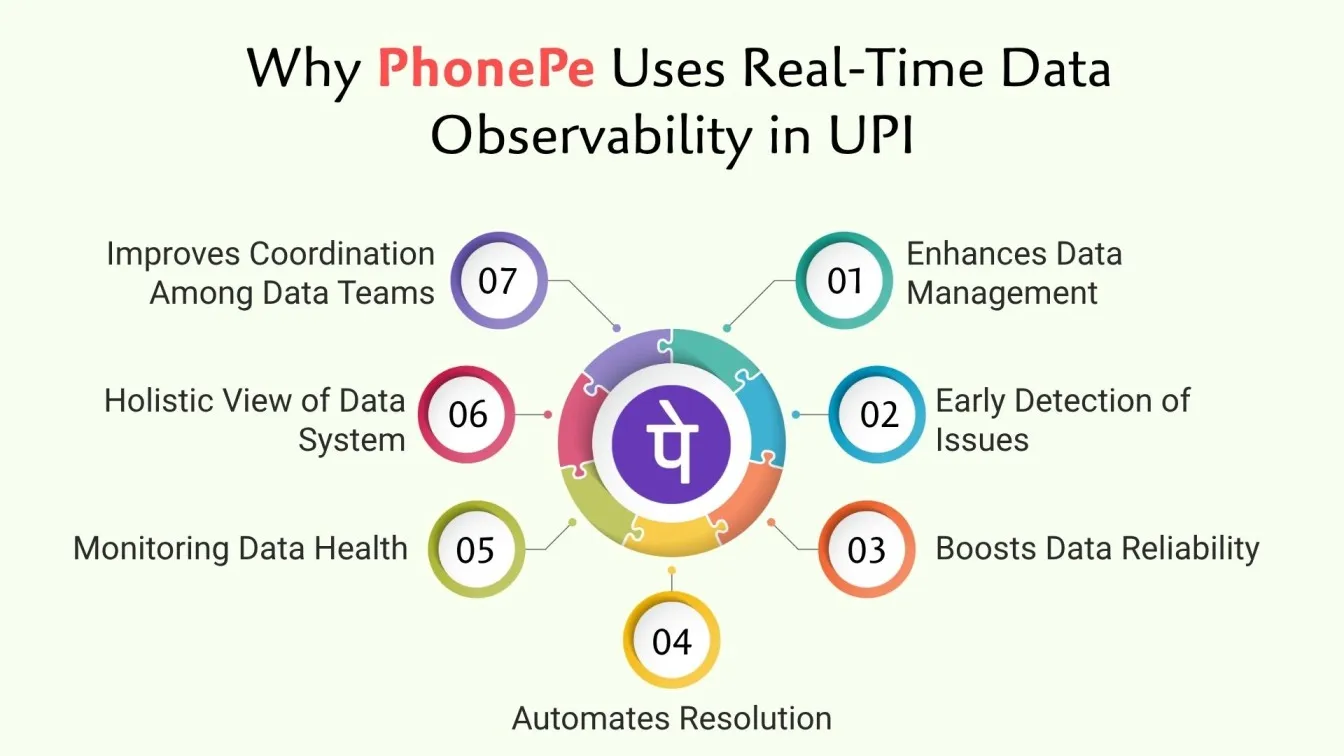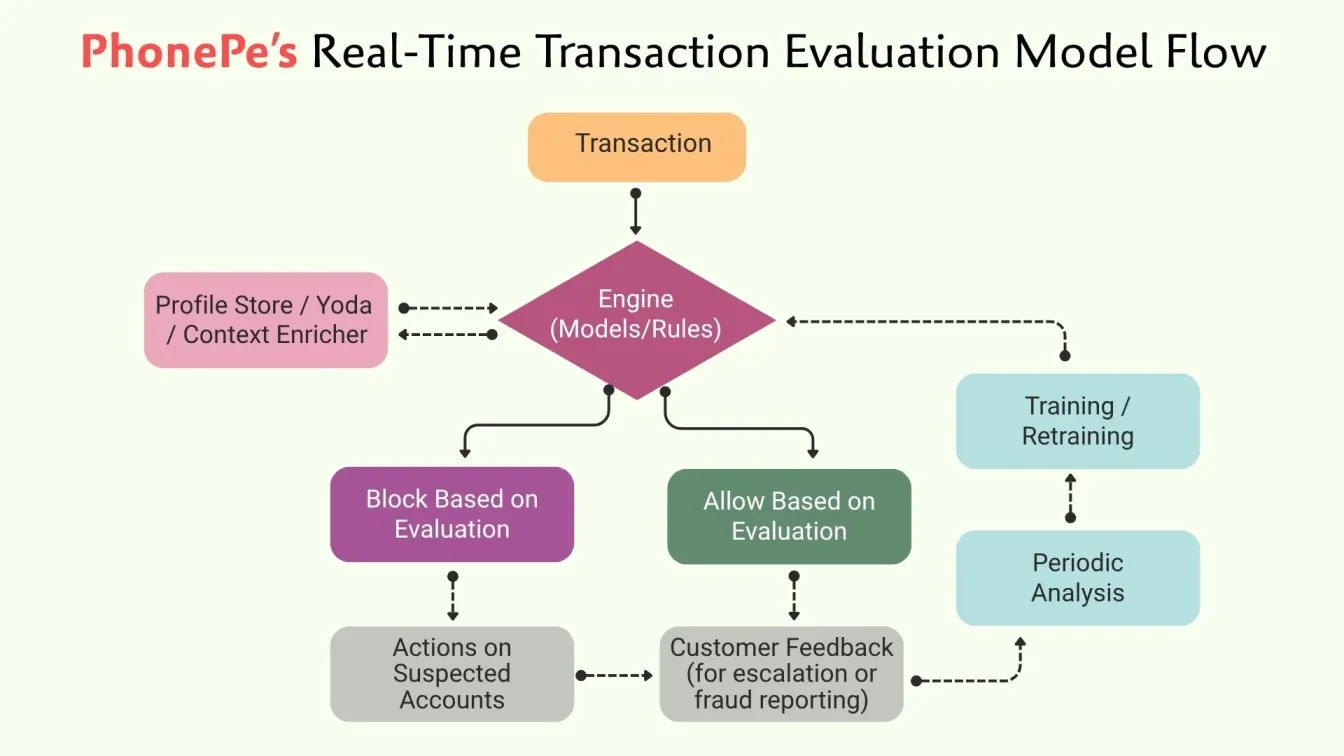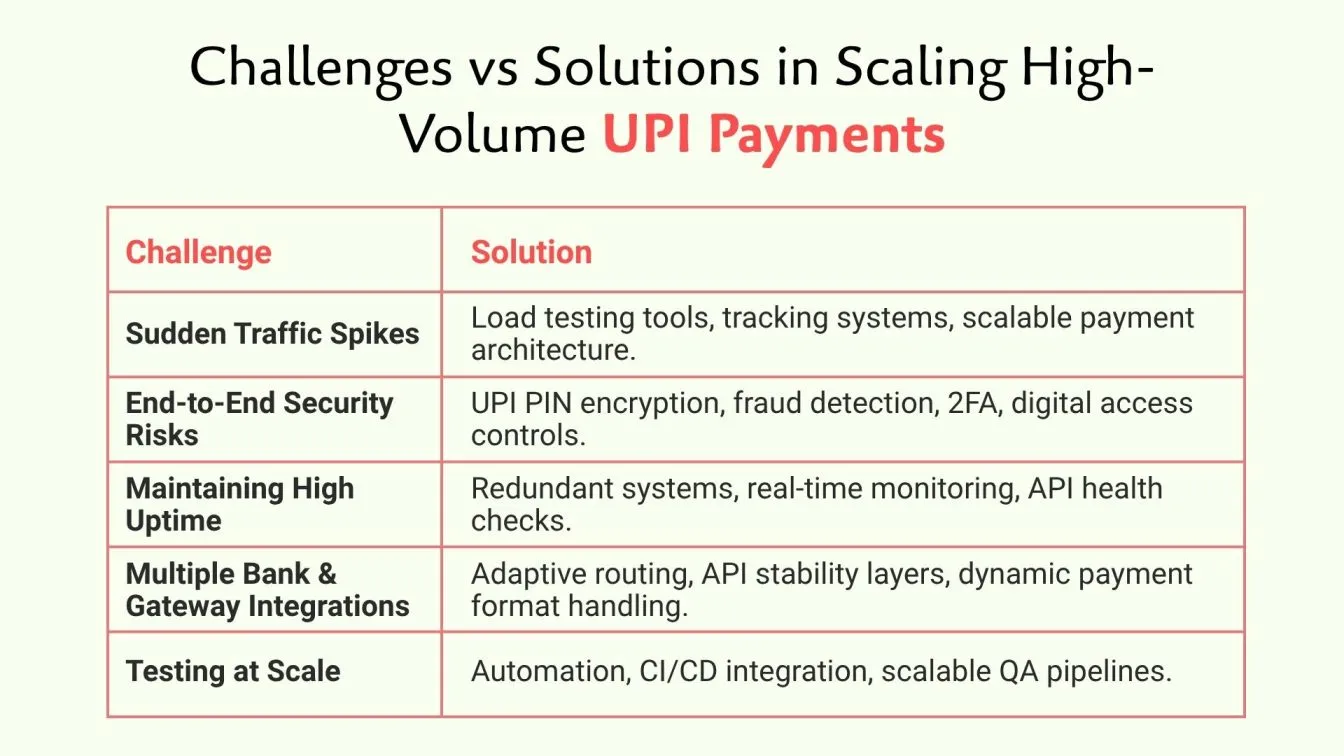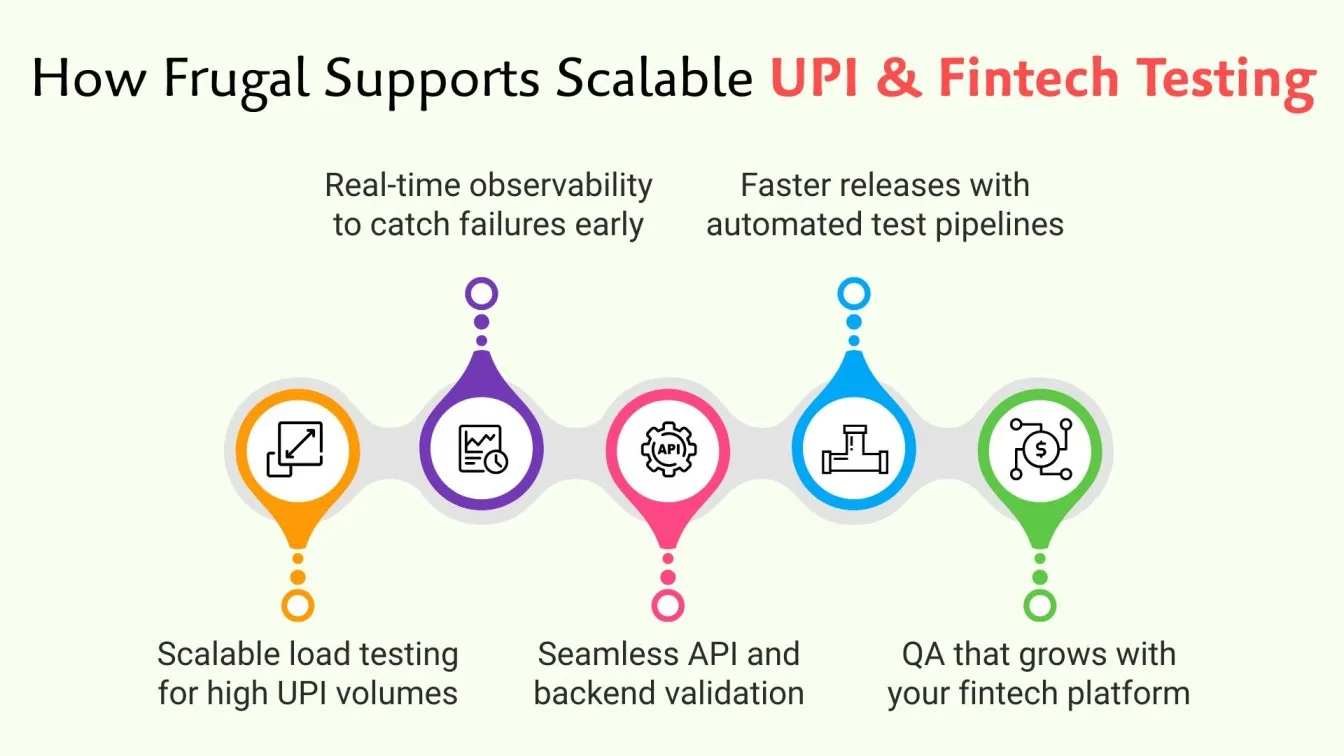In a growing UPI payment system, scalability ensures consistent service during high-demand periods. As fintech startups grow into national platforms like PhonePe, scalable architecture becomes essential for processing secure and seamless digital wallet payments.
Without reliable software testing services, high transaction volumes can lead to latency or failure. By investing in scalable infrastructure and thorough testing software, PhonePe enables businesses and users to accept digital payments confidently, upholding both speed and secure payment methods for online transactions.
💡What’s Next? Keep reading to discover:
🚀 How PhonePe ensures software quality in large-scale UPI payments
🚀 Key testing challenges in high-volume fintech systems
🚀 How automation improves performance, reliability, and release speed
🚀 Real-world testing use cases from PhonePe’s payment ecosystem
🚀 Tools and trends like ML, CI/CD, and real-time observability in testing
PhonePe at Scale: Powering Seamless Daily Transactions
The PhonePe app processes over 100 million UPI transactions daily, making it one of India’s most trusted digital payment platforms. Scaling to such volumes requires not only advanced fintech software development services but also resilient software testing strategies. Through a combination of load testing software, user testing software, and software testing automation, PhonePe ensures that transactions remain fast and secure. As a major player in the fintech and mobile digital payments ecosystem, PhonePe’s business model reflects its commitment to secure online transactions & payments across India’s growing UPI payment network.

The Importance of Scalable Payments
As India embraces digital payments, platforms like the PhonePe app must support millions of users simultaneously. A scalable UPI payment system ensures smooth performance, even during peak hours such as festivals or sale events. Scalability directly impacts the speed, reliability, and security of payment transactions essential for daily operations in fintech.
Why Scalability Matters in UPI and Digital Payments:
- Handles High Volume: Scalable systems support massive UPI transactions without failure.
- Enables Business Growth: Critical for fintech startups and PhonePe business expansion.
- Maintains Speed & Security: Ensures secure online transactions & payments at scale.
- Reduces Downtime: Minimizes crashes or slowdowns during spikes.
Top Testing Strategies Powering PhonePe’s UPI Success
PhonePe has built a resilient testing ecosystem powered by modern software testing services. These include performance testing, real-time monitoring, regression testing, and more, all of which ensure the PhonePe app remains fast, secure, and reliable.
These software quality assurance testing services are essential to scale fintech platforms and deliver frictionless, secure payment transactions across the nation. Below are the core testing strategies enabling PhonePe’s business and its digital payment success.
Performance and Load Testing
To deliver a seamless and consistent experience for users, PhonePe conducts thorough performance and load testing as part of its core software testing services. These tests help evaluate how the system performs when large numbers of users access the platform simultaneously, which is common during festivals, sales, or bill payment cycles.
Purpose:
The main objective is to ensure the app remains stable and responsive, even under heavy usage. It helps identify system slowdowns, server overloads, or API delays before they affect real users.
Tools Used:
- Apache JMeter – for simulating high traffic and measuring performance
- Gatling – for real-time load analysis
- Locust – for scalable user load simulations
Why It’s Important for PhonePe:
With increasing reliance on UPI payments and digital wallet payments, maintaining app speed and reliability is critical. These testing practices ensure the PhonePe app consistently supports large-scale secure payment transactions, contributing to its reputation in the fintech sector.
Real-Time Observability
To ensure smooth UPI transactions, PhonePe uses real-time observability tools to monitor system health and performance. These tools offer visibility into latency, errors, system load, and transaction failures. PhonePe also leverages Acceldata to scale observability across 1500+ Hadoop nodes while serving 350+ million users.

Purpose:
The goal is to instantly detect performance issues before they impact users. Real-time alerts and logs enable fast response. Using Acceldata, PhonePe reduced data warehouse costs by 65% and maintained 99.97% availability.
Tools Used:
- Prometheus & Grafana – Metrics tracking and visualization
- ELK Stack – Log analysis
- Acceldata – Distributed data observability
Why It’s Important for PhonePe:
In a high-volume fintech space, real-time monitoring ensures app stability, reduces downtime, supports secure UPI payments, and boosts customer confidence. It plays a vital role in ensuring uninterrupted services and business growth at scale.
Security and Vulnerability Testing
Security is a top priority for PhonePe, especially as it deals with sensitive user data and real-time UPI payments. Through rigorous security and vulnerability testing, PhonePe ensures that the platform is well-protected against potential cyber threats, data leaks, and unauthorized access.
Purpose:
The objective is to identify and fix security weaknesses in the application, APIs, and infrastructure. This includes testing for known vulnerabilities, securing user sessions, and ensuring data encryption.
Tools Used:
- OWASP ZAP and Burp Suite – for web application security testing
- Nessus – for vulnerability scanning
- Snyk – for open-source dependency checks
Why It’s Important for PhonePe:
With millions relying on PhonePe for secure payment methods for online transactions, maintaining a high level of application security is essential. This testing ensures that users can make digital payments confidently while safeguarding fintech infrastructure.
Fraud Detection Using ML
Detecting fraud in real time is crucial for PhonePe, where thousands of transactions occur every second. Each transaction is evaluated by a model-based engine using tools like Yoda, Profile Store, and Context Enricher to decide whether to allow or block it.

Purpose:
To analyze user behavior and transaction context instantly, identifying fraud patterns such as fake accounts or unusual activity.
Tools Used:
- Profile Store, Yoda
- Custom ML models (Python, Scikit-learn)
- Feedback loop and periodic retraining
Why It’s Important for PhonePe:
This system ensures secure payments, blocks fraud early, and keeps improving through feedback and retraining, helping PhonePe maintain trust at scale.
Automated Regression in CI/CD
As the PhonePe app frequently releases updates and new features, automated software regression testing is used to ensure that existing functionalities remain unaffected. These tests are integrated directly into the CI/CD (Continuous Integration/Continuous Deployment) pipeline.
Purpose:
The aim is to quickly detect bugs or conflicts introduced by new code changes, ensuring that critical payment features continue to function properly across all app versions.
Tools Used:
- Selenium and TestNG – for test automation
- GitLab CI/CD – for pipeline automation
- BrowserStack and Appium – for cross-device testing
Why It’s Important for PhonePe:
Automated regression testing helps deliver faster, safer updates to users without compromising the quality of digital wallet payments. It plays a crucial role in keeping the UPI payment app stable and reliable.
Infrastructure Resiliency & Multi-Cluster Recovery
PhonePe’s infrastructure is designed to remain resilient, even during unexpected outages or regional failures. Through multi-cluster recovery, the platform ensures uninterrupted service availability across locations.
Purpose:
The goal is to ensure system stability even if a server or data center goes down. The platform is tested to automatically reroute traffic and recover workloads in real time.
Tools Used:
- Kubernetes – for container orchestration and recovery
- AWS Multi-Zone Deployment – for regional distribution
- Gremlin – for chaos engineering and failure simulation
Why It’s Important for PhonePe:
Resilient infrastructure guarantees that users can continue their UPI payments without delays. This strategy is vital in maintaining business continuity and high availability for a growing fintech platform.
Identity & Behavioral Biometrics Testing
To further secure user access, PhonePe integrates advanced identity and behavioral biometrics into its platform. These features are rigorously tested to ensure accuracy and reliability during authentication.
Purpose:
This involves verifying users through patterns like typing speed, device behavior, or biometric data (fingerprint, facial recognition) to prevent impersonation and unauthorized access.
Tools Used:
- In-house testing tools for biometric accuracy
- APIs for behavior tracking and identity validation
- Integration testing with device sensors
Why It’s Important for PhonePe:
Incorporating biometrics strengthens secure payment transactions and supports fintech banking compliance. It adds another layer of safety for users making digital payments through the app.
Comparison: PhonePe vs Google Pay vs Paytm vs Amazon Pay
PhonePe, Google Pay, Paytm, and Amazon Pay are among the most widely used platforms for seamless and secure digital payments in India. While all of them support UPI transactions, their scale, underlying technology, and testing strategies differ, directly impacting user experience, performance, and trust.
Real-Life Use Cases That Prove PhonePe’s UPI Stability
To maintain smooth and secure UPI payments, even under extreme load, PhonePe relies on strong software testing practices, a resilient backend, and real-time monitoring systems. The following real-world cases show how PhonePe ensured UPI stability and solved critical challenges effectively:
1. Festive Season Spikes (e.g., Diwali, New Year)
Massive surge in traffic due to online shopping, gifting, and merchant offers, leading to a sharp rise in concurrent UPI transactions.
How PhonePe Solved It:
- Ran intensive load testing in advance using tools like JMeter and Gatling
- Used infrastructure scaling with container-based deployments (e.g., Kubernetes)
- Implemented real-time monitoring to detect delays and auto-correct routing paths
- Maintained near 100% uptime across services
2. Month-End Bill Payments & Salary Disbursals
Spike in digital payments for rent, utilities, EMI, and salary transfers, causing sudden backend load and latency risks.
How PhonePe Solved It:
- Applied automated regression testing to ensure feature stability
- Used behavioral biometrics and device binding to secure high-value payments
- Prioritized transaction queues intelligently to reduce timeouts
- Enabled parallel processing of billers and bank APIs to avoid chokepoints
3. Big Billion Days (Flipkart Sale Integration)
Rapid-fire online payments during Flipkart’s Big Billion Days checkout created heavy pressure on the UPI rail and backend verification systems.
How PhonePe Solved It:
- Pre-tested for extreme UPI traffic using performance simulation tools
- Used multi-cluster failover systems with a built-in tracking system to auto-route traffic during regional delays
- Integrated with Flipkart systems through secure APIs and real-time observability
- Detected and blocked suspicious patterns instantly using ML-powered fraud models like Kratos
Challenges in Scaling a High-Volume Payments Platform
Scaling a high-volume digital payments platform, especially one handling millions of Unified Payment Interface (UPI) transactions daily like PhonePe, involves a unique mix of technical and operational challenges. These affect transaction processing, user trust, security, and overall scalability across different payment options.

Here are the key challenges:
- Handling Sudden Traffic Spikes
Transaction volumes often surge during peak hours, festival sales, and payment request cycles. Without proper load testing software, tracking systems, and scalable payment terminals, spikes may cause delays or failed payment solutions. - Ensuring End-to-End Security
As users and payment requests through UPI grow, so do risks. Protecting transaction history, securing UPI PINs, and deploying card fraud detection systems, Two-Factor Authentication, and digital access control are essential to ensure seamless transactions. - Maintaining High Uptime Across Components
Every layer, from banking apps and APIs to merchant payments, must remain available. Downtime in one area affects payment link generation, payment terms, and real-time settlement, impacting user trust. - Integrating with Multiple Banks and Partners
Large-scale UPI apps interact with several financial institutions, credit card providers, and gateways. Varying speeds, payment request formats, or unstable APIs introduce delays, requiring adaptive routing logic. - Testing at Scale Without Slowing Delivery
Running QA on fast-moving codebases is tough. Without automation and integrated pipelines, testing delays affect releases. Ensuring coverage for loyalty rewards, cryptocurrency payments, and evolving financial services is key to meeting modern customer service expectations.
Final Thoughts on Testing at Scale for UPI Payments
In conclusion, managing UPI payments at scale demands more than just speed, it requires strong security protocols, reliable API integration, and intelligent software testing. Platforms like PhonePe ensure stable real-time transactions, handle payment requests, and resolve server issues swiftly through load testing software and real-time observability.
With support for QR Codes, P2P payments, mobile wallets, biometric authentication, and payment gateway integration, PhonePe continues to deliver seamless transactions. Its ability to secure bank accounts, upi payment limits, and uphold security and privacy reflects its leadership in the evolving Indian fintech landscape.

Frugal Testing, a leading SaaS application testing company, is renowned for its specialized AI-driven test automation services tailored to meet the evolving needs of modern businesses. Among the comprehensive services offered by Frugal Testing are advanced Fintech Software Testing Services, designed to ensure security, performance, and compliance in financial applications. The company also provides cloud-based test automation services, enabling scalable, efficient, and cost-effective testing solutions.
People Also Ask
👉 What is a QMS system in banking?
A Quality Management System (QMS) is a structured framework for improving software quality. It ensures compliance through defined processes and control tools.
👉 What role does API testing play in modern banking systems?
API testing validates data exchange between systems and third parties. It ensures accuracy, security, and uninterrupted financial services.
👉 How is test data secured in banking QA?
Banks use data masking, encryption, and synthetic test data to secure sensitive information while maintaining realistic testing environments.
👉 What challenges occur when testing third-party banking integrations?
Common issues include unstable APIs, access limits, and data mismatches, which affect test coverage and delay resolution.
👉 How do banks validate automation test results?
Validation is done through test logs, dashboards, and coverage reports to confirm test accuracy and reliability.





%201.webp)

